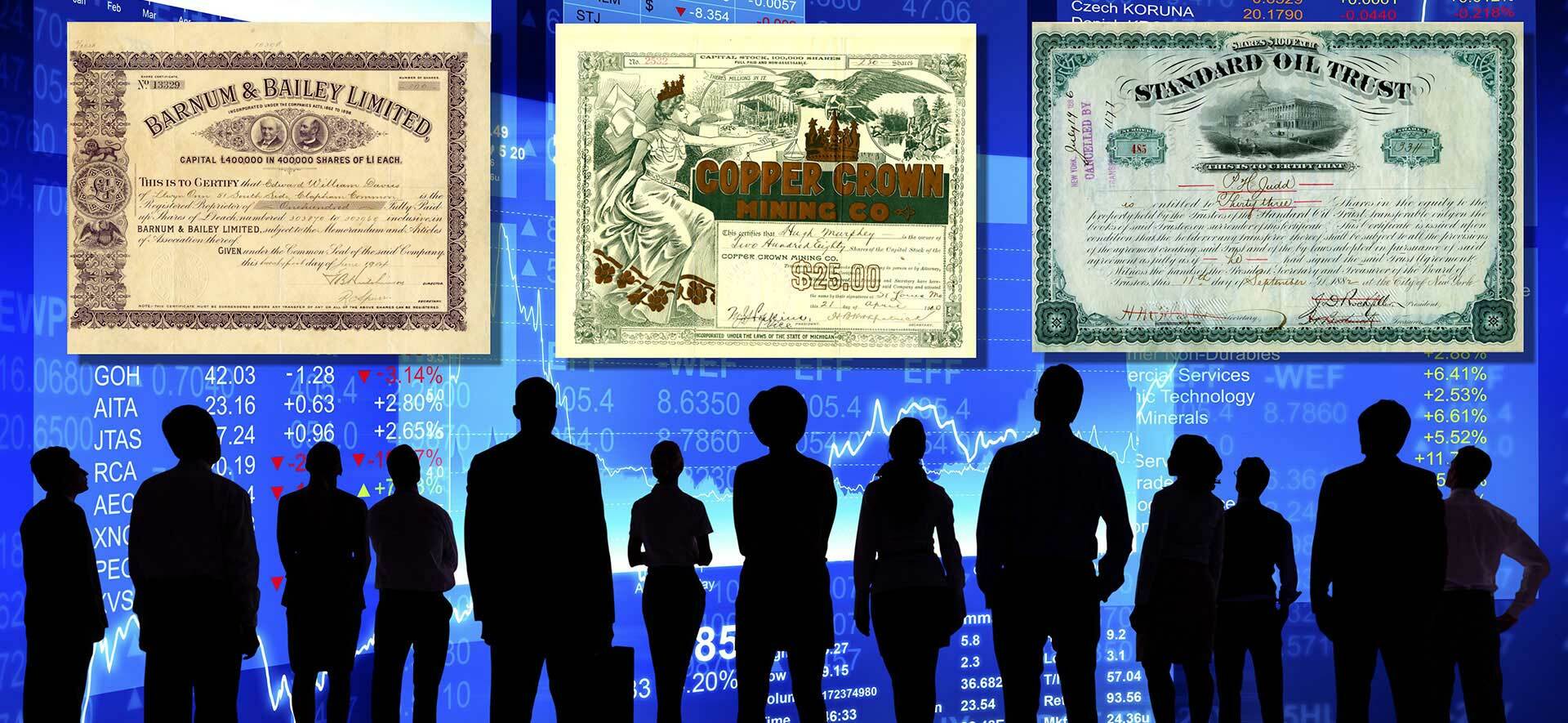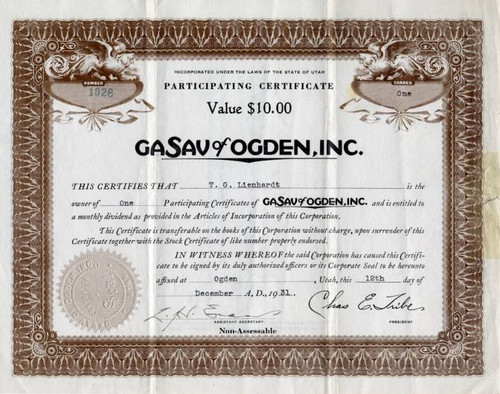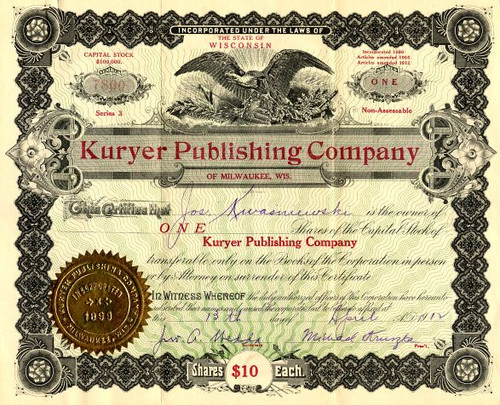Stock Ledger receipt from the Sutter Basin Company hand signed by J. Ogden Armour in 1913 and is over 96 years old. 
J. Ogden Armour Signature J. Ogden Armour Born November 11, 1863 Milwaukee, Wisconsin Died August 16, 1927 (aged 63) London, England Nationality American Occupation Businessman Jonathan Ogden Armour (November 11, 1863 August 16, 1927) was an American meatpacking magnate in Chicago, and owner and president of Armour and Company. During his tenure as president, Armour & Co. expanded nationwide and overseas, growing from a small regional meatpacker to one of the largest food products companies in the United States. J. Ogden Armour was born in Milwaukee, Wisconsin to Philip D. and Malvina B. Armour. He was the couple's first child; a brother, Philip D. Armour, Jr., followed. The year he was born, his father became a partner in the meatpacking firm of Plakington & Armour. The family moved to Chicago in 1865. In 1867, Armour's father decided to move the company's primary meatpacking operations from Milwaukee to Chicago. His business partner disagreed, and sold his interest in the company to the senior Armour. The firm moved, and changed its name to Armour & Co. J. Ogden Armour attended Yale University, but dropped out in his senior year in order to assist his father with the family company. He became a partner in the firm in 1884. Armour met the former Lola Sheldon (she later used the name "Lolita") in 1891. They married in Mexico in 1892, and had one daughter, also named Lolita. As his father's health declined, J. Ogden Armour took over more and more responsibility for the direction of Armour & Co. His younger brother, Philip Jr., died in 1900. J. Ogden Armour took over as company president in 1901. During his tenure, sales skyrocketed from $200 million to $1 billion. In July 1904, the year after Armour took over the company, the Amalgamated Meat Cutters struck all meatpackers in Chicago. Armour and the other employers broke the union by hiring thousands of unemployed African American strikebreakers. The hiring of the strikebreakers provoked a riot involving 4,000 union members and their families on August 19, 1904. The strike collapsed in mid-September. Social reformer Jane Addams met personally with Armour to secure a contract which helped the union survive. In 1911, Armour and nine other meatpackers were sued by the federal government for violations of the Sherman Anti-Trust Act. Armour convinced the other owners to let the case go to the jury without offering a defense; Armour and the other meatpackers were acquitted. To finance the company's growth during World War I, Armour sold $60 million in bonds to the public in 1917. These bonds were converted to stock in 1919, making Armour & Co. one of the first publicly-traded meatpacking firms. In the post-war slump, Armour & Co. sales collapsed and the company went $144 million in debt. Armour lost most of his family fortune--at $100 million (about $1 billion in 2007 dollars), then the second-largest in the world--in the downturn. The company lost $125 million between 1919 and 1921. Armour, owner of $100 million in stock, suffered the most. During the worst period, Armour lost a million dollars a day for 130 days. J. Ogden Armour was unable to reinvigorate the company, and was ousted as president in 1923. His successor was F. Edson White. J. Ogden Armour also owned the Kansas City Power & Light Company and the Metropolitan Street Railway, also of Kansas City. He sold his interests in both companies in 1923. He was also a significant investor in the Chicago, Milwaukee, and St. Paul Railroad and the Illinois Central Railroad. He was a co-owner of the Armour Grain Company. During a market panic on the Chicago Board of Trade in August 1914, he helped avoid a spike in wheat prices by selling hundreds of thousands of bushels of grain. In 1901, the same year he took over Armour & Co., Armour donated $1 million to the Armour Institute, the college his father had founded. Additionally, he was a founding director of the South Shore Country Club in Chicago. In 1909 he was silent partner for Frederick Gilmer Bonfils and Harry Heye Tammen in the purchase of the Kansas City Post. Armour played a role in aviation history when he bankrolled the pioneering transcontinental flight of Cal Rodgers. Armour used the flight to promote the introduction of a grape-flavored soda called Vin Fiz. The plane, and its accompanying railroad cars, were painted with Vin Fiz logos. Armour built an Italian-style estate on 1,200 acres (4.9 km) of farmland at Mellody Farms in Lake Forest, Illinois, in 1908. The estate was designed for his daughter, who was crippled as a child. This former estate is now part of the campus of Lake Forest Academy. J. Ogden Armour wrote two books: The Packers, the Private Car Lines, and the People in 1906 and Business Problems of the War in 1917. Armour was the inspiration for one of the meatpacking plant owners in Upton Sinclair's classic novel, The Jungle. The 1904 strike against Armour & Co. figures in the novel's plot. Armour and Mellody Farms appear (under pseudonyms) in Arthur Meeker's 1949 social satire Prairie Avenue. The novel is about the foibles of wealthy Chicagoans and their move away from Chicago's South Side. Armour retired to California. In the summer of 1927, he traveled to London, England, and fell ill with typhoid and then pneumonia. As his condition worsened, he was attended by Lord Dawson of Penn, personal physician to King George V. Armour died of heart failure at 4:30 p.m. London time on August 16, 1927. He had less than $25,000 in cash in his accounts, although his stock holdings in the Universal Oil Company were estimated at $3 million. "I lost money so fast, I didn't think it was possible." "I have had some of the finest friendships any man ever had, although mine probably have been the most expensive friends anyone ever enjoyed. My friends have cost me a great deal of money, yet there is not one of them whom I can hate for it." "I don't suppose I shall ever be happy. Perhaps no one ever is. But the thing that would make me happiest just now would be to know that I could get roaring drunk and wander about the loop for two days without anyone paying any attention to me." History from Wikipedia and OldCompany.com (old stock certificate research service).

J. Ogden Armour Signature













